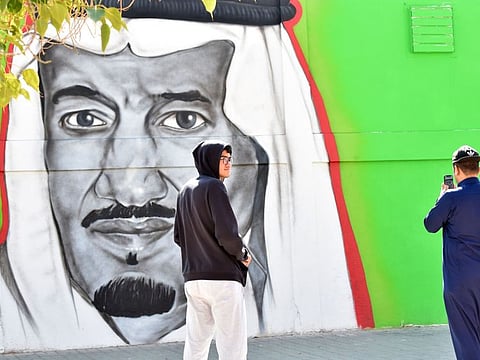With eye on Iran, GCC summit could try to resolve dispute with Qatar
Summit comes as Iran accused of a series of attacks including on Saudi Aramco facilities

Also In This Package
Cairo: Leaders of the six-nation Gulf Cooperation Council (GCC) gather Tuesday for their annual summit in Riyadh amid serious efforts to heal a prolonged rift between a Saudi-led bloc and Qatar to better tackle regional challenges including Iranian threats.
On Sunday, Saudi King Salman Bin Abdul Aziz, whose country is hosting the summit for the second year in a row, met he bloc’s Secretary General Abdul Latif Al Zayani in Riyadh.
They discussed the agenda of the summit and “ways of enhancing the joint Gulf work march,” the official Saudi news agency SPA reported without details.
Created in 1981, the GCC comprises Saudi Arabia, the UAE, Bahrain, Kuwait, Oman and Qatar.
Qatar dispute fallout
The US-allied bloc has felt the fallout from a dispute that erupted more than two years ago pitting Saudi Arabia, the UAE, Bahrain and Egypt against Qatar.
In June 2017, the quartet cut off diplomatic and transportation links with Qatar over its support for extremist groups.
The four countries have repeatedly demanded Doha to comply with a set of conditions to end the standoff. The demands include Qatar’s severance of links with militant and terror groups, scaling down ties with Iran and shutting down Al Jazeera TV, seen as a mouthpiece of the banned Muslim Brotherhood.
Qatar has refused the conditions, saying they violate its sovereignty.
Optimism over breakthrough
In the run-up to the Riyadh summit, Kuwait has intensified its US-backed efforts to defuse the Gulf crisis and suggested that its bid is bearing fruit. Washington wants to resolve the row among its regional allies in order to focus attention on building a coalition against Iran, which it brands as the world’s prime terror sponsor.
“Kuwait looks forward to the Gulf summit with a lot of optimism and hope to achieve Gulf people’s aspirations for security and stability,” Kuwait Deputy Foreign Minister Khalid Al Jarallah said last week.
Also Read: Kuwaiti Emir sends message to Qatar ruler
“There are indications that the page of disagreement between brothers will be closed,” added the Kuwaiti official.
Last month, Saudi Arabia, the UAE and Bahrain sent their national teams to play in the Gulf Cup, the region’s prestigious football tournament, a move that signalled de-escalation in tensions.
In late 2017, the three countries stayed away from the tournament that was due to be held in Qatar, but they reversed their non-participation after the championship was switched to Kuwait.
Earlier this week, Qatar’s Foreign Minister Mohammad Bin Abdul Rahman confirmed reports about talks between his country and Saudi Arabia to end the Gulf feud.
“We have moved from a stalemate to some progress where some talks took place between us and specifically Saudis,” he added at a foreign policy forum held in Rome.
Qatar must change behaviour
Saudi Minister of State for Foreign Affairs Adel Al Jubeir, an outspoken critic of Iran, renewed the kingdom’s stance that normal ties with Qatar hinge on Doha’s change of heart.
While Al Jubeir was tacit, Egyptian Foreign Minister Sameh Shukri whose country is a major ally of Saudi Arabia was more pronounced.
“Qatar has not stopped its subversive policy,” Shukri said.
“It is hosting terrorist organisations, supporting them and interfering in the internal affairs of the region’s countries,” he added.
The remarks were made days after the Saudi-led quartet accused Qatar at The Hague-based UN high court of reneging on its anti-terror obligations.
In 2014, Qatar signed a pact in Riyadh to end an earlier Gulf crisis, committing it to halt support for terrorist groups and hostile media campaign against other Arab countries
The anti-Qatar quartet’s unified argument, spelt out at the International Court of Justice, lowers expectations for imminent fence-mending with Doha.
“Harmony in the stances of the four countries that are boycotting Qatar is still strong,” said Egyptian analyst Hassan Abu Taleb.
“There are, meanwhile, big doubts that Qatar is prepared to rehabilitate itself to act in line with Gulf and Arab rules in facing threats and sources of danger,” added Abu Taleb, a columnist in private Egyptian newspaper Al Watan.
He noted that Qatar has not joined a US-led international maritime coalition to safeguard shipping in the Gulf.
“Qatar has not participated yet in this American effort despite its [Doha’s] distinguished ties with the American side. This is because of Qatar’s openness to Iran, a stance that basically contradicts the US maximalist policy against Iran to compel it to change its behaviour,” Abu Taleb said.
Iran to dominate summit
While the agenda of the GCC summit is not public yet, the urgency of Al Jubeir’s message makes Iran a top item.
The Riyadh summit comes amid rising tensions between Saudi Arabia and Iran.
Riyadh and Washington have squarely blamed Iran for a September 14 attack on major Saudi oil facilities.
Riyadh has repeatedly urged the world to stand firm against Tehran and its destabilising acts through regional proxies.
“The region is facing a choice between good and evil after the attack on installations of Saudi Aramco,” Al Jubeir said at a security conference in Bahrain last month.
“Deterrence should continue to prevent Iran from repeating attacks… Appeasement did not work with Hitler and won’t work with the Iranian regime,” he added.
Al Jubeir renewed the warning this week in Rome.
“[Iran’s] aggression can no longer be tolerated,” he said on Friday.




